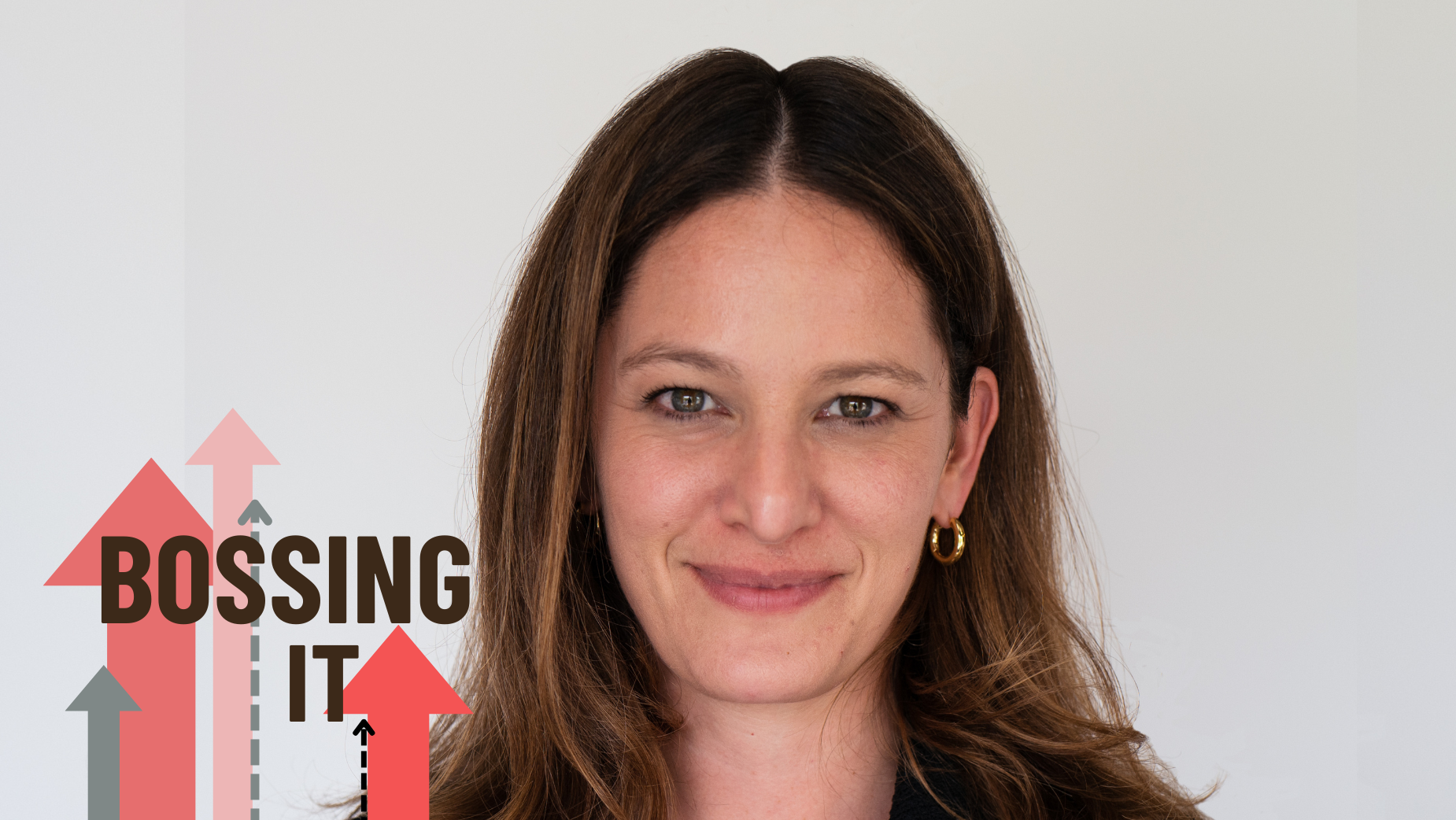
“Leaders Set the Weather”: Lafayette American’s Emily Siegel on Influence, Honesty and Growth

Emily Siegel is the president and a founding partner of Lafayette American, a strategy and creative agency in Detroit with an in-house branding and design studio, Scorpion Rose Studio.
Before Lafayette American, Emily led the content studio at team Detroit/WPP, helping Ford find innovative ways to tell its most important brand stories. Emily was named a Crain’s Detroit 40 under 40 in 2022 and a 2015 “Woman to Watch” by Ad Age.
LBB> What was your first experience of leadership?
Emily> I’m the only girl in my family - sandwiched between brothers - and I think there’s something about being a middle child only sister that’s akin to the ‘eldest sister’ position. You learn early that you need to drive a lot of the action. And, if you’re lucky, like I was, you get to have a big voice.
My parents always had colleagues for dinner parties, and my brothers and I were expected to attend and join the conversations. My mom took me on her business trips and talked me through her itineraries and wardrobe choices. It was an absolute masterclass in being a woman in a powerful professional role.
In high school, I got involved in student government and was president of my class. I played competitive sports, became a camp counselor, coach, etc.
When my high school field hockey coach made me co-captain my senior year, it was an endorsement in me and my ability to lead. During a time when young women are awkward and insecure, it means something to have that vote of confidence. We went on to win a State Championship.
LBB> How did you figure out what kind of leader you wanted to be – or what kind of leader you didn’t want to be?
Emily> I’ve had the pleasure of learning from some incredible managers and mentors over the years, (Lydia Worthington, Mary Gail Pezzimenti, Curt Jaksen, Thomais Zaremba, to name a few), and there are patterns in their styles that resonated with me over time: transparency, lack of ego, empathy, high expectations.
I also think that for the most part, you don’t really choose what kind of leader you are – you’re just who you are, and either you’re someone who naturally steps into leadership or you aren’t. Of course, you can read leadership books and listen to podcasts and take classes and get better at the tactics of leadership, but you can’t be someone you aren’t.
I’m an honest, decisive person, I’m comfortable delegating, I’m good at reading the room, I like to teach, I like to be taught. I think those are some of the ingredients.
LBB> What experience or moment gave you your biggest lesson in leadership?
Emily> Someone told me once (in so many words) that I have the kind of personality that can either lighten or darken a room – that I’m the kind of person whose mood can impact the moods of the rest of the people in the space, and I need to be conscious of that influence. I think about that a lot. Leaders set the weather. That’s a big responsibility.
LBB> What are the aspects of leadership that you find most personally challenging?
Emily> I’m a pleaser, so it’s a constant battle to be OK with the very real and totally fair fact that not everyone is going to like me. You can’t be everyone’s friend. The business just won’t work. I try to subscribe to the notion that it’s more important to be kind than nice. People will respect you as long as you treat them with kindness, but they don’t always have to think that you’re nice.
My best advice is to find people at your company or in similar roles elsewhere who can be your community. I’m very lucky that at Lafayette American I have business partners whom I consider dear friends. I also have friends in the industry at other companies who I go to for advice and opinions. And, I have a very patient husband who acts as a lovely sounding board from time to time.
LBB> Have you ever felt like you've failed whilst in charge? How did you address the issue and what did you learn from it?
Emily> Of course! Leaders don’t necessarily know more than the rest of the team – they’re just the ones with the 30,000 foot view, responsible for making the best calls based on the information available. Most of the calls turn out well. Some absolutely don’t. You just hope there are more wins than failures. That’s all part of it. A crystal ball would help.
I’ve built teams with one structure and had to pivot to an entirely different structure in the middle of a project. I’ve made decisions that took our entire company down a path only to question years later whether we should have done something completely different all along. I’ve had to do layoffs, I’ve lost pieces of business, I’ve lost friendships.
We’re all just doing our best with what we’ve got. And when we fail – because failure is inevitable – all we can do is learn. What could I have done differently? How will I be better next time?
LBB> In terms of leadership and openness, what’s your approach there? Do you think it’s important to be as transparent as possible in the service of being authentic? Or is there a value in being careful and considered?
Emily> I’m a very transparent person. It’s a core value of mine. That said, as I’ve matured in my leadership, I’m becoming more discerning. I’m learning that not everyone thrives from having access to all the information the way I do. Not everyone wants it.
In parenting, you hear the advice that children, like passengers on a plane, just want a pilot who tells them "it’s a little turbulent out there, but everything's going to be alright, folks”. A steady hand. The same is true leading a team. There are some people who want to know just how much turbulence we’re seeing and exactly how we’re going to navigate it, and there are others who just want to know that it’s all gonna be okay, and the clouds are clearing up ahead.
LBB> As a leader, what are some of the ways in which you’ve prioritised diversity and inclusion within your workforce?
Emily> I have the distinct privilege of not only being a leader, but also a company founder. My partners and I established our employee policies, including our HR practices and in our early years, we took very seriously the responsibility of our employee handbook. In doing so, we have taken some critical, foundational measures:
Inclusionary hiring practices,
Establishing a DEIB annual report, with clear goals and accountabilities,
Regularly sourcing portfolios and resumes from fresh, diverse voices and perspectives,
Establishing scholarships to help build a pipeline of future diverse leaders,
Ensuring progressive policies with regard to parental leave and caregiver coverage.
But additionally, and maybe more importantly, what I’ve found is that because of my role, I am in a position to be a voice in the room that asks the tough questions and champions the critical efforts required to : Does this insight feel representative? Who are we hiring for production, and did we seek BIPOC and women-owned organisations?
LBB> As you developed your leadership skills did you have a mentor, if so who were/are they and what have you learned? And on the flip side, do you mentor any aspiring leaders and how do you approach that relationship?
Emily> My mom. OG. Forever mentor. I grew up looking up to my mom, a working woman, who left the house every day in a beautiful suit with a leather briefcase and incredible shoes – the most glamorous woman in the world. She taught me how to do a proper handshake and how to sit at a conference table with body language that commands the room (hands on the table, leaning in), which is different from how to sit at a dinner (hands at your lap, sitting tall).
In my professional life, I believe in having a personal board of directors – it’s a concept that was introduced to me by one of mine, Thomais Zaremba, and it stuck.
As far as my own experience as a mentor, the most gratifying thing is seeing people who I’ve mentored or who have worked with me become powerhouses in their own careers. And I wouldn’t be surprised if I’ve learned more from the young people I’ve mentored than they have from me. Being a mentor, a teacher – there’s no better feeling.
LBB> In continually changing market circumstances, how do you cope with the responsibility of leading a team through difficult waters?
Emily> Honestly, my family keeps me grounded. No matter what’s happening at work, I come home to my five- and seven-year-old, and to them, I’m just mom. They don’t care what I’m dealing with at work. I help with homework, break up squabbles, clean the kitchen, pack backpacks, run baths. By 9pm when that shift is done, I’m exhausted, but I’m ready to think again about what we are dealing with at work.
People talk all the time about the challenges of being a working parent, and it’s all true – that’s a post for another day – but we don’t talk enough about how therapeutic it can be. Family life acts as a great forcing mechanism to detach from the stresses of the work day.
Of course, if that doesn’t work, there’s always jogging (slowly). Or the Peloton. Touching grass. Fresh air. And if that doesn’t work: a skosh of bourbon.















